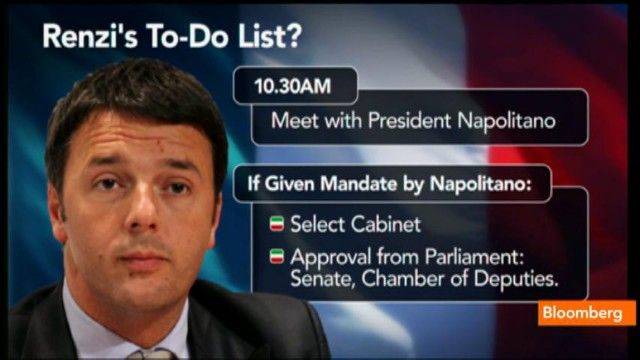Napolitano Taps Renzi--so Now What?
ROME - If the cabinet which Premier-designate Matteo Renzi is cobbling together is confirmed within the next week or so, as is predicted, it will be Italy's third emergency government in a row, and one again lacking the benefit of sanction by voters. But never mind: after his long meeting with President Giorgio Napolitano in the Quirinal Palace on Monday, Renzi said Monday that the two did not chat about the names of potential members of his cabinet, but instead discussed a program of four crucial reforms which Renzi says he will "go for broke" to introduce within the next four months. The next day, Tuesday, Renzi--who is not a member--entered Parliament and actually got lost, if briefly. Can he help Italy find its way out of what he has called "a swamp"?
The first of his stated goals, which he hopes to have voted by the end of this month, is the revised election law agreed upon in a meeting between Renzi and former Premier Silvio Berlusconi. As described so far, the bill, whose aim is to ensure governability, would boost the party or coalition winning at least 37% of the vote in a national election to a 55% majority in Parliament. Under the existing despised "Porcullum" or pigsty law, the majority premium could apply to a party winning only 30% of the vote. If none achieves that 37%, a run-off would take place. This is important because the Italian vote has lurched into a three-way split with the right grouped around Berlusconi and his reborn Forza Italia (FI); the left around Renzi's Partito Democratico (PD); and the radicalized, angry heterogenous voters supporting Beppe Grillo in the Moviment Cinque Stelle (M5S).
The second goal, to be achieved by the end of March, is introduction of what Renzi calls, in English, "il Job Act," or redistribution of the labor market. This will require whittling away some of the guarantees for workers introduced in the Socialist party-sponsored "Statute of the Workers" back in 1970. It presupposes making it easier to fire workers so as to hire others, especially young people. The unions are not happy, neither are craftsmen and owners of small businesses. In Rome today thousands demonstrated. At home in Florence this weekend Renzi himself, the city's former mayor, was met by a demonstration of unionized city employees. He has also proposed a one-size-fits-all unemployment benefit.
The third goal, slated theoretically for enactment by the end of April, is a reform of the bureaucracy. This is complex, for it implies reducing the number of workers employed in the government sector while boosting its efficiency at the same time.
The fourth goal proposed by the end of May is revision of taxation. Because the government administration is old, its modernization would require those lower taxes which will, it is hoped, stimulate productive employment.
Can this be done? Redistribution of the labor market, for one thing, will require structural reforms, and this implies actions over the longer term. Among these is reform of the Senate, considered by many too close a mirror of the Chamber of Deputies, or an "overly symmetrical bicameral legislature" that tends to create legislative paralysis.
"Above all he must act swiftly," says Sergio Fabbrini, professor of political science and international relations at the prestigious LUISS school of government in Rome. "Renzi has just one possibility: to govern through a direct relationship with the citizens, explaining to them--even before he speaks to the politicians--just what it is he intends to do." Fabbrini warns that, while it is true that the governing partners must first agree, that will not suffice. "A precondition for the country to go forward is not only to achieve agreement within the government, but also with the others. What is needed is a pact with the voters, if we are to emerge from this horrid period."
On the other hand, Renzi's secret weapon is fear of new general elections. While his governing partner, outgoing Interior Minister Angelino Alfano may be tempted to talk tough to Renzi, this will not be easy. Alfano's New Center Right party (NCD) is a splinter from the former Berlusconi-dominated Partito della Liberta' (PDL), and no one knows how the NCD will perform in an election. The Renzi-Berlusconi revised election law agreement included a 5% minimum vote for parties to enter into Parliament. This clause has the smaller parties, including Angelino's, nervous. Renzi's gamble is that fear of new elections will keep his troops in order--and just may allow him to meet some of his deadlines. Beppe Grillo's M5S has lost a few percentage points in recent polls, but even so, "Both the PD and those further to the right around Berlusconi and Alfano are terrified of facing an election against Beppe Grillo," said a Renzi insider.





































i-Italy
Facebook
Google+
This work may not be reproduced, in whole or in part, without prior written permission.
Questo lavoro non può essere riprodotto, in tutto o in parte, senza permesso scritto.